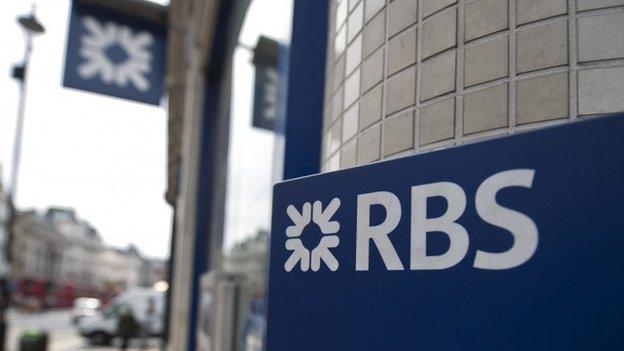Royal Bank of Scotland in new push on government stake sale
- Published

After six years and a myriad of rows and mis-steps, RBS is to make a fresh push for a return of the bank to private ownership.
Senior figures within the bank have told me that the government body responsible for the public's 80% stake, UK Financial Investments, has been approached about exploring a series of small stake sales to kick start the process.
The bank believes that the government should sell an initial tranche of shares worth about £5bn to test the market.
Although the sale would be at a loss on the amount the government originally paid to bail out the bank, it would automatically boost the share price - RBS believes - as institutional investors would take the prospect of future sales more seriously.
Senior figures insist that the core bank, which is profitable, is attractive to the market.
They point out that the initial sale of the government's then 40% stake in Lloyds Banking Group in 2013 led to a spike in the share price.
Over the year, Lloyd's share price rose by 65%. The sale also had the not unwelcome effect of raising £3.2bn for the Treasury's coffers.
The government bailed out RBS in 2008 at around 500p a share. That price dropped to an average 407p over subsequent weeks - a price the Treasury could argue is "break even". RBS also paid billions of pounds in fees to the government for a continuing insurance facility.
Today, RBS shares are trading around 340p, a figure little changed from six months ago.
I asked one senior figure intimately involved in the discussions when RBS would like to see the stake sale commence and he answered, only half in jest: "Tomorrow."
The source said that UKFI was very sympathetic to a sale, as it understood that a bank outside direct political control was likely to perform more strongly.
"Shareholders dislike the present arrangement, clients dislike it and I'm sure ultimately the government dislikes it," the source said. "This arrangement was never supposed to last this long. As an enduring model, it is very tough to make it work.
"The question is, is it acceptable to sell initially at a loss? Well, that is the economic reality.
"You don't need to make your money back on all the tranches. If you did 10 tranches, do you have to make a profit on every one? Any sensible investor would say the important thing is, make money over the whole process."
RBS is now working on giving investors confidence that remaining risks in the bank are understood and accounted for.
The first area of concern is litigation costs, the billions of pounds of misconduct payments still working their way through the system.
These include legal actions connected to the financial crisis rights issue, legal actions by the US mortgage providers Fannie Mae and Freddie Mac over the manipulation of the interbank lending rate and costs associated with allegations concerning the foreign exchange market.
RBS sources point out that both Barclays and Deutsche Bank raised capital, despite concerns over possible misconduct fines.
The second issue is RBS's own capital position. That will be helped by two events - the sale of RBS's American retail bank, Citizens, and the Bank of England's own stress tests.
Both are likely to be completed by the end of the year. The sale of Citizens will mean that RBS can repatriate capital held in America back to the UK.
RBS believes that the Citizen's sale could improve the bank's key Tier 1 capital position by two and a half percentage points to 12%.
Will a stake sale happen this side of a general election? The government has certainly sent out very negative signals on that, saying in January, external that it was "not part of any timetable".
The Liberal Democrats are also looking at putting a mass RBS share giveaway in their manifesto, an idea that has been backed by Nick Clegg, external.
RBS will certainly have an up-hill battle convincing politicians that a sale is a good pre-election idea. Sir Philip Hampton, the chairman, made an attempt to get the idea off the ground last year, but has made little progress since.
George Osborne would probably like a "period of silence" about banks - a story that dos not often play well for the government. Vince Cable has suggested any sale could be five years away.
But RBS will keep plugging away, as their latest efforts reveal. Politicians, as we know, are not always noted for their consistency.